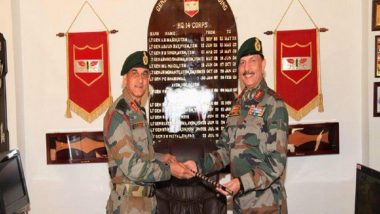Srinagar, September 1: Kargil war hero Lieutenant General Yogesh Kumar Joshi, who led the assault to capture Tiger Hill as the Commanding Officer of the 13th Battalion of Jammu and Kashmir Rifles, took charge of the 14 corps of the Indian Army on Friday. He is assigned with the defences of Ladakh which includes Kargil. Lt. Gen Joshi has been appointed as the General Officer (GOC) of the ‘Fire and Fury' Corps. He assumed command from Lt. Gen. SK Upadhyay. He took over the charge as the 17th Corps Commander.
Lt Gen Joshi has already commanded a Brigade and a Division in this sector. He also served as Director General, Infantry. During the Kargil war, the then Lt. Colonel Joshi led the 13th Battalion of the J&K Rifles to launch four successful attacks during the Operation Vijay in 1999. In one of the attacks on Point 4875, Captain Vikram Batra of his battalion laid down his life. The point is now called Batra Top. Captain Batra was awarded Param Vir Chakra Posthumously. Apart from Captain Batra, Rifleman Sanjay Kumar of 13 JAK Rif also awarded PVC.
During the Kargil War, his battalion won two PVCs, 8 Vir Chakras, and 14 Sena Medals. His battalion earned the title of the ‘Bravest of the Brave’. He also went to China as the Defence Attache from 2005 to 2008. He has also handled the Military Operations Branch in the Army Headquarters.
It is General Joshi's fourth tenure dealing with Chinese troops. Earlier, three postings, including going to China as the Defence Attache (2005-08). He commanded a brigade and a Division in Eastern Ladakh. He has also led the Army in various talks with the Chinese officials both in India and in China. Now, both Eastern and Western Ladakh will be under his responsibility. Eastern Ladakh shares Line of Actual Control (LAC) with China, while Western Ladakh includes the Kargil, having its Line of Control (LoC) with Pakistan. Siachen also comes under his area of responsibility.
Kargil War was fought between May-July 1999. The war was fought on the mountains of Kashmir in Kargil at an altitude more than 15,000 feet. T. It was generally an untold tradition that the armies of both the sides leave their bunkers at high altitude places move downwards and later during summers they reoccupy their bunkers. But in 1999, Pakistan took undue advantage of India’s trust and when Indian soldiers vacated their bunkers during the winters, mujahideens and Pakistan army soldiers occupied the Indian bunkers.
(With inputs from ANI)
(The above story first appeared on LatestLY on Sep 01, 2018 10:03 PM IST. For more news and updates on politics, world, sports, entertainment and lifestyle, log on to our website latestly.com).













 Quickly
Quickly





















